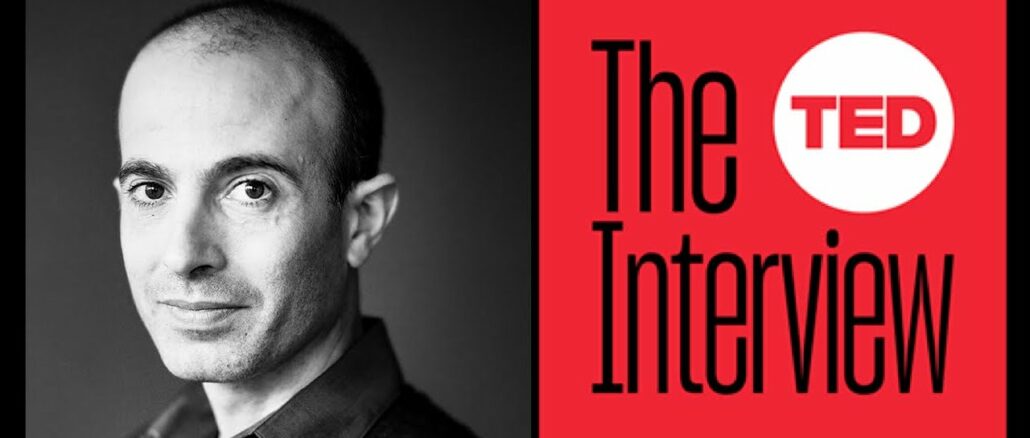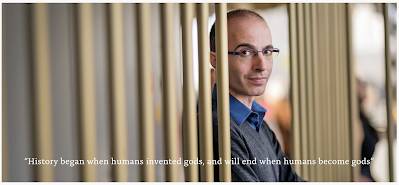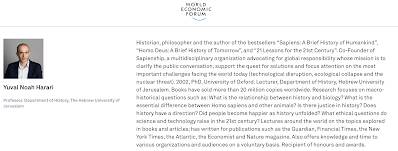
Yuval Hariri and Why the Future Doesn’t Need Most Human Beings
While you may not have heard of him, Yuval Noah Hariri is playing a key role in our dystopian future as is being designed under the trade name of “The Great Reset” by the World Economic Forum.
To get a sense of Hariri’s belief system, here is a screen capture from his personal website:
From the WEF’s website, here is a page dedicated to futurist Yuval Hariri with some information on his background:
His book, “21 Lessons for the 21st Century” was elected as November 2018’s book of the month by the World Economic Forum Book Club as shown here:
Here is a quote from an article by Peter Koenig on the May 2022 WEF meeting which appeared on the Chongyang Institute for Financial Studies website outlining the relationship between Hariri and WEF founder and head architect Klaus Schwab:
“Klaus Schwab hired the Israeli “futurist scientist” Yuval Noah Hariri, apparently Klaus Schwab’s closest advisor, as far as his dream world “The 4th Industrial Revolution” goes, an all-digitized world. Hariri produces videos galore to convince the people that they are mere “hackable” animals, and eventually will be subjected to brain manipulation, either by implanted chips or directly by 5G ultra-short-waves.
It’s part of scare-mongering, but also part of truth-telling about their intention. This dark cult must divulge their intention in whatever convoluted way so that their plans may come through. That’s part of the cult’s rule.
And because our brains are vulnerable and can be chipped or otherwise manipulated, The Reset’s final doctrine, “You own nothing but will be happy” may also be true.“
Back in 2020, Hariri addressed that year’s WEF Davos global elite clusterf$ck with a “blistering” presentation on what lies ahead for the world:
Here are some key quotes with my bolds:
“In Davos we hear so much about the enormous promises of technology – and these promises are certainly real. But technology might also disrupt human society and the very meaning of human life in numerous ways, ranging from the creation of a global useless class to the rise of data colonialism and of digital dictatorships.
Automation will soon eliminate millions upon millions of jobs, and while new jobs will certainly be created, it is unclear whether people will be able to learn the necessary new skills fast enough. Suppose you are a fifty-years-old truck driver, and you just lost your job to a self-driving vehicle. Now there are new jobs in designing software or in teaching yoga to engineers – but how does a fifty-years-old truck driver reinvent himself or herself as a software engineer or as a yoga teacher? And people will have to do it not just once but again and again throughout their lives, because the automation revolution will not be a single watershed event following which the job market will settle down, into a new equilibrium. Rather, it will be a cascade of ever bigger disruptions, because AI is nowhere near its full potential.
Old jobs will disappear, new jobs will emerge, but then the new jobs will rapidly change and vanish. Whereas in the past human had to struggle against exploitation, in the twenty-first century the really big struggle will be against irrelevance. And it is much worse to be irrelevant than exploited.
Those who fail in the struggle against irrelevance would constitute a new “useless class” – people who are useless not from the viewpoint of their friends and family, but useless from the viewpoint of the economic and political system. And this useless class will be separated by an ever-growing gap from the ever more powerful elite.“
Note the use of the words “useless class”.
Hariri has a long history with this concept. Here are some quotes from a 2017 article excerpted from his book “Homo Deus: a brief history of tomorrow”, again with my bolds:
“The most important question in 21st-century economics may well be: What should we do with all the superfluous people, once we have highly intelligent non-conscious algorithms that can do almost everything better than humans?
…In the 21st century we might witness the creation of a massive new unworking class: people devoid of any economic, political or even artistic value, who contribute nothing to the prosperity, power and glory of society. This “useless class” will not merely be unemployed — it will be unemployable.“
On August 9, 2022, TED (Technology, Entertainment, Design), a non-profit organization devoted to “Ideas Worth Spreading” as shown here:
…posted an interview with Hariri on its website which you can find here:
At the 14 minute mark, we find this:
“A lot of people sense that they are being left behind and left out of the story, even if their material conditions are still relatively good. In the 20th century, what was common to all the stories — the liberal, the fascist, the communist — is that the big heroes of the story were the common people, not necessarily all people, but if you lived, say, in the Soviet Union in the 1930s, life was very grim, but when you looked at the propaganda posters on the walls that depicted the glorious future, you were there. You looked at the posters which showed steel workers and farmers in heroic poses, and it was obvious that this is the future.
Now, when people look at the posters on the walls or listen to TED talks, they hear a lot of these big ideas and big words about machine learning and genetic engineering and blockchain and globalization, and they are not there. They are no longer part of the story of the future, and I think that — again, this is a hypothesis — if I try to understand and connect to the deep resentment of people, in many places around the world, part of what might be going there is people realize — and they’re correct in thinking that — that, ‘The future doesn’t need me. You have all these smart people in California and in New York and in Beijing, and they are planning this amazing future with artificial intelligence and bio-engineering and global connectivity and whatnot, and they don’t need me. Maybe if they are nice, they will throw some crumbs my way like universal basic income,’ but it’s much worse psychologically to feel that you are useless than to feel that you are exploited.
If you go back to the middle of the 20th century — and it doesn’t matter if you’re in the United States with Roosevelt, or if you’re in Germany with Hitler, or even in the USSR with Stalin — and you think about building the future, then your building materials are those millions of people who are working hard in the factories, in the farms, the soldiers. You need them. You don’t have any kind of future without them.
“Now, fast forward to the early 21st century when we just don’t need the vast majority of the population…because the future is about developing more and more sophisticated technology, like artificial intelligence [and] bioengineering, Most people don’t contribute anything to that, except perhaps for their data, and whatever people are still doing which is useful, these technologies increasingly will make redundant and will make it possible to replace the people.”
There will be many exciting and new jobs for humans. The problem is that it’s not clear that many humans will be able to do them because they will require high skills and a lot of education so a lot of humans will be left behind even if there are new jobs….the new jobs will require a lot of skills and retraining….“
Let’s repeat the key sentence:
“Now, fast forward to the early 21st century when we just don’t need the vast majority of the population…”
So there you go. According to Hariri’s thesis, the future doesn’t need us. The term “useless eaters” becomes even more pertinent in the dystopian, technologically advanced world that Klaus Schwab and his band of disciples (including Hariri) are promoting for the surplus population who will serve no purpose in the future other than to waste food and other resources that might be better used by the global elite along with supplying them with some data points to feed their AI technology. If you don’t think that depopulating the world is part of the new Great Reset narrative, perhaps you might want to think again since the only solution to the global ecological stress is to significantly “decrease the surplus population”, as written by Charles Dickens in A Christmas Carol.
Let’s close with this thought:
Perhaps the future doesn’t need futurists like Yuval Hariri and, for that matter, dreamers like Klaus Schwab and his ilk.






Be the first to comment